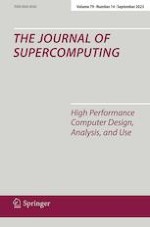20-04-2023
A machine learning-based resource-efficient task scheduler for heterogeneous computer systems
Published in: The Journal of Supercomputing | Issue 14/2023
Log inActivate our intelligent search to find suitable subject content or patents.
Select sections of text to find matching patents with Artificial Intelligence. powered by
Select sections of text to find additional relevant content using AI-assisted search. powered by
